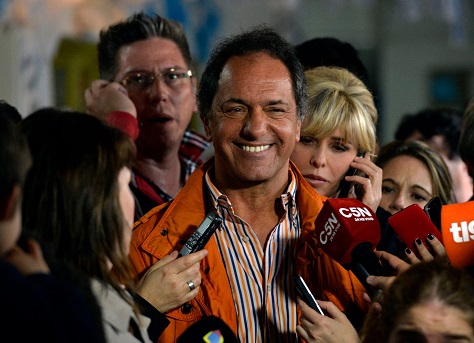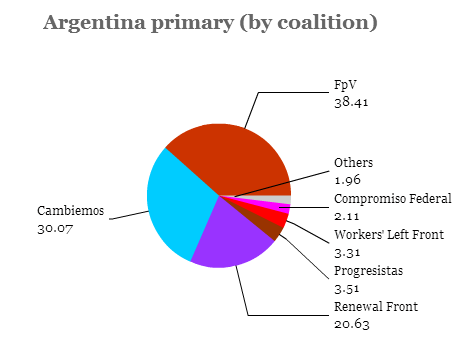There’s some bit of good news for each of the three contenders battling to win the Argentine presidency on October 25 after Sunday’s primary contest.![]()
Since 2011, Argentine elections have features an all-in primary contest in which every candidate competes both in absolute terms against all the other candidates and both for his or her party (or coalition) nomination. No one doubted that each of the three major contenders would win his inter-coalition primary:
- Daniel Scioli, the governor of Buenos Aires province, ran unchallenged for the nomination of the governing ‘Justicialist’ Frente para la Victoria (FpV, the Front for Victory) of Cristina Fernández de Kirchner, and the bloc won nearly 38.5% of the vote.
- Mauricio Macri, the more center-right chief of government of the city of Buenos Aires, easily won the nomination of the three-party Cambiemos coalition, with over 24% of the vote nationally.
- Sergio Massa, the one-time frontrunner, former Kirchner cabinet chief, Tigre mayor and leader of the peronista, if not kirchnerista, Frente Renovador (FR, Renewal Front), easily won the nomination of his own coalition, with over 14% of the vote.
Those results, though, overstate Scioli’s strength. While the Kirchner-backed candidate has plenty of reason to be thrilled with the primary vote, Macri was facing two opponents for the Cambiemos nomination and Massa faced an own opponent for his own coalition, ‘United for a New Alternative.’
When you add together the votes for the coalitions, Macri can expect to enter the final campaign sprint with something more like 30% to Scioli’s 38% — with Massa’s coalition winning around 20.5%.
There’s no doubt that Scioli’s success demonstrates a perhaps surprisingly united Argentine left, with reform-minded voters pulling away from Massa and towards Scioli (pictured above). Despite a scandal-plagued year, Fernández de Kirchner’s approval ratings are on the rise and, although inflation and other economic woes still plague Argentina, the economy is generally doing much better than neighboring Brazil or Chile and, in any case, better than in 2013 and 2014. Unlike his opponents, Scioli benefits from a truly national political network, which was clear on Sunday — the FpV won more votes in all but three provinces. As the governor of the country’s most populous province, he currently serves 16.3 million of Argentina’s 41.5 million-strong population. Moreover, Fernández de Kirchner and the current government will be doing everything in its power to bolster Scioli’s chances in the next two months.
Though she cannot herself run for reelection, Fernández de Kirchner’s close ally Aníbal Fernández (currently chief of cabinet) narrowly defeated Julián Domínguez in the hard-fought primary to win the FpV gubernatorial nomination for Buenos Aires province (and to success Scioli). Furthermore, Fernández de Kirchner is believed to have influenced Scioli to appoint as his running mate Carlos Zannini, a Kirchner loyalist and the presidential legal secretary since 2003. The fortunes of Zannini and Fernández mean that Fernández de Kirchner will wield strong influence in any Scioli administration.
* * * * *
RELATED: What to expect from
Sunday’s Argentine presidential primaries
* * * *
Nevertheless, Scioli’s allies worry that he will be forced into a November 22 runoff against Macri. Scioli’s 38.41% support is a bit short of the 45% he will need on October 25 to win the presidency outright (alternatively, he could win with 40% of the vote so long as he defeats his opponent by at least a 10% margin). The primary results suggest that, barring a massive turn among Massa’s supporters to the ruling party, Macri will get a chance to take on Scioli directly.
Since 1983, the end of a brutal seven-year military junta, no presidential election has advanced to a runoff.
Continue reading Scioli leads in Argentine presidential race after primaries


